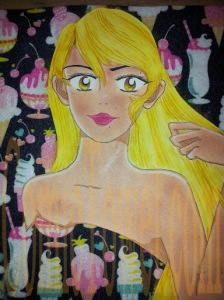I found this sketch while cleaning out a couple of sketchbooks, drawing tablets and portfolios. There, tucked underneath a couple of bags from Hobby Lobby, lay this drawing. I don't recall when I started it, or why I stopped. I just looked at it and was suddenly inspired to create something sweet, using my favorite blond character, Towel (that's her nickname)! The thing is that I fought the impulse to make changes to the sketch. Instead, I wanted to act right away with the coloring process. Didn't want to think too much. Just wanted to grab the sketch and move.

As always, inking comes next. My favorite Precise V5 pen did the grunt work. Followed by a simple yellow Sharpie (yes, Sharpie) to outline her hair. Last, I used a sand-colored Copic marker to outline and give a little shadow/shading. I chose the skin-toned markers according to–you guessed it–skin tone. And though she's blond, it doesn't mean she's a tanned blond. Nevertheless, I always try to shadow lightly, throwing the whole concept of coloring "by light source" out the window. I also used a flesh-colored Copic marker to guide her upper lip so I wouldn't lose the shape before I added a darker color.
Here, I water colored her hair a simple canary yellow. And because her eyes are brown, I gathered my usual three-tones to give her eyes a gradient-like effect. Always more color!
X-acto knife ready, I carved away the negative space to get her ready for the felt, ice cream backdrop I decided to use. I didn't glue her on right away because I knew that it would be a mess to do so first and then start using chalk pastels. I also knew it would be a mess to add the chalk pastels and then use the x-acto knife to carve her off the negative space. So for a while, I had me a cute paper doll tapped to my drawing board.
I normally use a dark toned pastel to match a character's hair, but here I used a matching yellow instead. I coated her lips with a dark pink Prismacolor pencil. These are my favorite pencils because of their soft, creamy tips. As for the chalk pastel, used for her skin toned, I chose a shade of brown that I more or less liked when I first laid it down. I managed to even it out by blending in a lighter flesh color, running a dry paper towel over the two to even her out. Of course, I used a thin-tipped eraser to clean the edges.

Three Prismacolor pencils used to add layers and effect to her hair. A very light canary yellow, golden rod yellow, and an almost sienna brown were used. Once the streaks of pencil are in, I use another dry paper town to blend it all in with the chalk pastel. Then I use a gummy eraser to add highlights in long streaks. I retook the Precise V5 pencil to fill in her pupil and mark some effect lines on the edges of her iris. Lastly, I glued her to the felt, seemingly as if she came out of a pocket of space.

The digital scan. But first, I added the usual whiteout shimmer to her lips and eyes. I also added the cutie 3D stickers in support of the theme (sweets and ice cream). The cherries work as earrings; the watermelon (hopefully) as a ring. As for the drawing, I did the usual reviving of color the second I scanned it. That seems necessary when a drawing moves into digital format. I also cleaned up around her arm. When I found the original sketch there were marks I had to work over that I knew during the process were going to need retouching. I have yet to retouch her left eyebrow by slimming it down and back some. And while her arm is a little shapeless, I decided to leave it as it is. As I mentioned earlier, I didn't want to get into making adjustments to the sketching part; instead I jumped right in.
Hopefully I didn't miss anything. Yeah well, I know I did somewhere. Anyway, thanks everyone for allowing me to share this!
Another on the way!




















